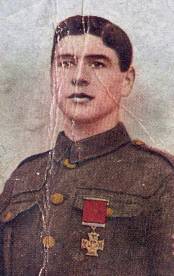Robert Downie facts for kids
Quick facts for kids
Robert Downie
|
|
|---|---|

Robert Downie as depicted on a cigarette card
|
|
| Born | 12 January 1894 Glasgow, Lanarkshire, Scotland |
| Died | 18 April 1968 (aged 74) Glasgow, Lanarkshire, Scotland |
| Buried |
St. Kentigern's Cemetery, Glasgow
|
| Allegiance | |
| Service/ |
|
| Rank | Sergeant |
| Unit | The Royal Dublin Fusiliers Home Guard |
| Battles/wars | World War I World War II |
| Awards | Victoria Cross Military Medal |
| Other work | Cashier |
Robert Downie was a brave Scottish soldier. He lived from 1894 to 1968. He is famous for receiving the Victoria Cross. This is the highest award for bravery a soldier can get. It is given to British and Commonwealth forces. He also received the Military Medal.
Contents
Heroic Actions in World War I
Robert Downie was born in Glasgow, Scotland, on January 12, 1894. When World War I began, he joined the British Army. He became a sergeant in the 2nd Battalion of The Royal Dublin Fusiliers.
Bravery at Lesboeufs
On October 23, 1916, Sergeant Downie was fighting in France. Most of the officers in his unit were hurt. The attack had stopped. Sergeant Downie showed amazing courage. He didn't care about his own safety. He was under very heavy enemy fire. He quickly organized his fellow soldiers.
At a very important moment, he ran forward. He shouted, "Come on the Dubs!" This was a nickname for his regiment. His shout made his unit move forward right away. Sergeant Downie fought bravely. He took down several enemy soldiers. He also captured a machine-gun. He stopped the enemy team using it. Even though he was hurt early, he stayed with his company. He helped them secure their new position.
A Hero's Welcome Home
When Robert Downie returned home, he was a hero. Hundreds of people met him at Glasgow Central Station. They carried him on their shoulders to a taxi. His street, Springburn Road, was decorated with flags. Many more people lined the street. Newspapers in Glasgow reported his brave actions.
Life After the War
After World War I, Robert Downie continued his life. He attended a special event in London. This was the World War II Victory Day Celebration. It happened on June 8, 1946.
He lived in Springburn, Glasgow, until he passed away. He died on April 18, 1968. Many football fans at Celtic Park knew him. He worked there as a cashier at the stadium entrances. Robert Downie was a humble man. He often made light of his bravery. He would joke that he won his medals for "shooting the cook."
Robert Downie is buried in St Kentigern's Cemetery in Glasgow, Scotland.

